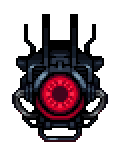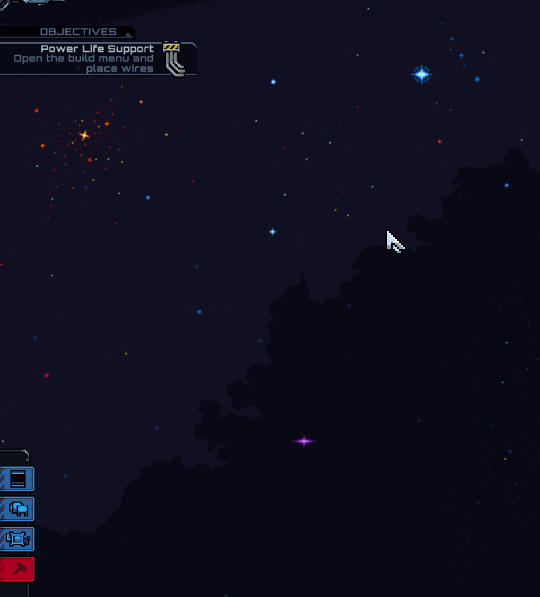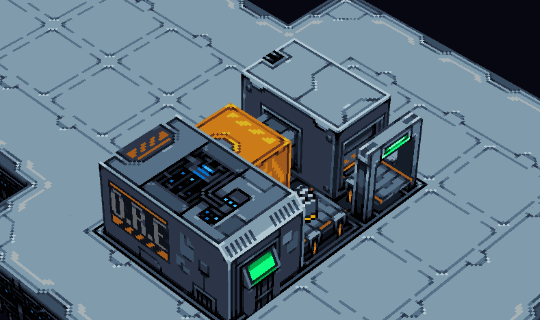Thanks to everyone who visited the booth! It was really nice to meet all of you in person.
Now that EGX is over, we’ll be going back to posting and updating much more consistently.
(I attempted to write about all of the new things, but this post just kept getting longer and longer, so I didn’t include everything).
Video
Here’s a video (if you would rather watch instead of read). All of the blog content is in the video and vice versa.
Feature Freeze
We’re happy with the amount of features currently in the game, so we’re entering a “Feature Freeze” where we don’t add any new big features.
Instead, we’ll be playtesting, balancing, fixing bugs, and improving performance. Our intent is to make the game actually fun and accessible for new players (and experienced players).
Our guiding rule for the new player experience is “Teach the player to fish instead of giving them a fish”.
Accessibility
EGX was the very first time that we watched people play the game in person. It was incredibly helpful to us in figuring out which parts of the UI and the game are weird, confusing, or just unnecessary.
Objective Display
We’ve added an “Objective Display” on screen during the tutorial. This will show players what they’re supposed to be doing during the start of a new game. We’ll probably also use the objective display to show the player critical information, like when atmosphere is venting to space or when morale is dangerously low.
You can click on any objective and it will open the build menu to the relevant section.
Nudges
Nudges are little prompts to the player that teach them about a feature they’ve never used.
Maybe you’ve been playing for an hour, but you’ve never actually assigned a job or changed the color of an object, because you never knew that you could do that.
With the new system, we can detect that and show the player a message like, “Colonists are started to grumble that everything looks the same, you could recolor some of the furniture to make them happy”.
A random nudge is shown every 3-8 minutes.
Build Menu Changes
We adjusted the visuals of the build menu slightly, the category buttons are now on top and the buttons are slightly more noticeable.
There is no longer a “Standard Wall” option in the menu entry, instead new walls have to be built with the foundation tool. We also removed the Foundation category (because it only had 1 object in it).
Cosmetics are also built instantly now.
Notifications
Notifications are the things that say “Unpowered Object”, and “No Clean Water”.
They appear above objects (in-world), in the HUD, and in the object window.
You can now click on any of those, and it will open the build menu to the relevant section.
So if you click on the “Unpowered Object” notification it will open the build menu to the power section.
Build Advice
While watching people play at EGX, there were many times when I would give players advice about things like:
Holding and dragging Foundation
Recoloring Objects
Painting Walls
We wanted to put this advice directly into the game (because I won’t be sitting next to most of you while you play :( ).
The advice is randomized, and specific to each object (so a Wall Vent can have different advice from a Bed).
Item Usage
We also wanted to make it more clear to players that objects have a build cost, and that items are consumed/produced during production.
This should make it more obvious when an object takes or creates an object directly from/to the pipe grid.
Gameplay Changes
We’re in the process of making a number of gameplay changes. We felt that there were many mechanics that could be simplified, combined, or removed altogether.
One of our rules is, “Micromanagement should be present, but never forced”.
Morale Overhaul
We’ve really simplified the morale system. (this could be an entire blog post, but I’ll summarize it).
There are now (tentatively) 3 categories that all morale modifiers are grouped into:
Social: Talking to friends, seeing enemies, etc
Safety: Seeing broken objects, taking damage, starving.
Freedom: Not enough free time, food quality, paintings
Each category can be in the range -100 to +100, and they slowly reset back to 0.
Colonist morale is an average of these 3 categories.
You can think of this like mood in The Sims, where mood is derived from the needs of the sim.
The intent of this change is to provide the player with a much better grasp on the issues facing their colonists. If you see that a colonist has social issues, you’ll at least know where to start (and you won’t be able to cheese it by placing cosmetic posters everywhere).
Golden Morale
If you keep colonist morale consistently high, they enter “Golden Morale”. It lasts for around 3 minutes, but the duration can be extended by providing morale bonuses.
While in Golden Morale your colonists are much more useful:
No negative morale modifiers will be acquired
Colonist will only talk about positive memories
Colonist will not instigate fights (and the aggression required to fight back is increased)
All skills are improved by 1
Colonist will always work
Colonists can become “inspired” (next section)
The intention is to provide the player a mechanical reason (and reward) for actually caring about colonist morale.
Object Unlocking
You no longer start the game with every single object available.
There are broadly 3 reasons for this:
Simplify the starting experience so that new players aren't overwhelmed
Give players a sense of progression and meaning
Allows the players to experiment with what they have instead of playing the exact same way every time.
Imagine being a new player and trying to figure out how to acquire Biomass. You have to open the build menu and scroll past 9 types of tables, 3 types of beds, 4 types of shelves, and a whole bunch of objects that are way past your skill level (like trading and performing missions).
The only (current) way to unlock new objects is by keeping colonist morale high. When colonists enter Golden Morale, they become inspired and they’ll start to research new objects. Research takes place while colonists go about their day—they’ll even research while sleeping.
Every time a colonist unlocks an object, they’ll gain Research experience, and they’ll research their next object faster.
Objects are currently grouped into: Cosmetic, Exterior, Furniture, Food, Industrial. In a way where you’ll never get an object from the sam category twice in a row (in the future, we want to add some sort of system where the player can control which type of objects they’ll unlock).
Depending on how unlocking feels, we’ll expand it so that the player can unlock objects through trading and quests. We’ll also place colonist requirements on some objects. A nuclear reactor, for example, might require research from a level 10 mechanic.
Build Cost
Object build costs are now deducted immediately when you place an object, and you cannot place an object (even the blueprint) if you lack the required resources.
This means that if you place something, you can actually afford it.
In the old system, players would build huge rooms, and then they wouldn’t understand why half their station wasn’t being built.
The biggest con of this system is that players can no longer plan out huge, elaborate stations at once.
There are now pop-ups when you spend or gain items
You’re also refunded 50% of the build cost whenever you destroy a constructed object. You are refunded 100% of the build cost if you cancel object construction.
Crop Drop-Off
Farmers no longer require the Crop Drop-Off. Instead, they can deposit crops to any object that stores raw food (shelves or refrigerators).
The Crop Drop-Off just felt…weird. It still exists but it’s no longer mandatory.
Default Jobs
Colonists now start with the Laborer, Farmer, and Mechanic job. This reduces the amount of things that new players are forced to do.
You can still assign jobs if you want to, but it’s one less thing you’re forced to do.
Water Recycler
The water system in the game was in a strange spot.
There was: Clean Water, Dirty Water, and Ice.
Clean water is used for cooking, creating Oxygen, and growing crops. Dirty water could be recycled back into clean water. Ice could also be directly converted into dirty water.
In practice, this made either Ice or Dirty Water unnecessary. If you mined enough Ice, you’d never have to place a Water Recycler. Alternatively, you could just recycle all of your water and never ever mine for Ice.
On principal, I don’t dislike this. I think it’s fine to provide the player with a few different options for achieving the same goal.
The issue is that new players are never encouraged to mine Ice—after all, the Water Recycler seemingly provides an endless supply of Clean Water. Eventually, the player would run out of water, they wouldn’t know how to get more, and everyone would die.
So we’ve removed the Water Recycler for now. This will force players to mine for Ice. As a side benefit, it would get the player familiar with the process of acquiring resources from outside the station. If we don’t like this change, we’ll add it back.
By the way, toilets produce Biomass now (previously they were producing Dirty Water).
Passive Biomass
Another complicated mechanic for players is how to acquire Biomass.
Biomass is the “green goop” used to grow new colonists. It’s acquired by recycling organic material, like food.
Unfortunately, in order to get food, you need a Farmer (and a Laborer to actually transports the food).
So before a player could even figure out the Biomass system, we were forcing them to grow a colonist, which have an entirely new set of systems that the player needs to learn.
Our solution was to add an Algae Box. It doesn’t require any colonist interaction at all. This means we can start the player with 0 Biomass, and they’ll actually have time to learn how the storage and pipe system works.
There’s no art for this yet (we’re using an old fish tank model), because we’re playtesting it. If we like how it feels, we’ll add some real art.
Bed Ownership
Beds are no longer automatically “claimed” by colonists.
Previously, once a colonist slept in a bed, they would “own” it, and no colonist could ever use it. The intent was to give colonists a “bedroom”, so that they would sleep in the same area every night.
This was confusing to new players, because they couldn’t figure out why a colonist was sleeping on the floor when there was a perfectly good bed (because another colonist had automatically “owned” it)
The player can still assign beds, but they’re not forced to.
Performance Improvements
I adjusted the back-end of Starmancer so that it could support multiple threads. This allows multiple things to happen at the same time, or for certain processes to occur in the background.
Generating pathfinding routes, for example, could occur in the background. This would prevent any freezing if route generation took an exceptionally long time.
Saving is now at least 10 times faster. Loading is now slightly faster. Placing objects is now slightly faster.
So Long
Sorry that we’ve been so quiet, but we’re back now!
Thanks for reading,
-Tyler






